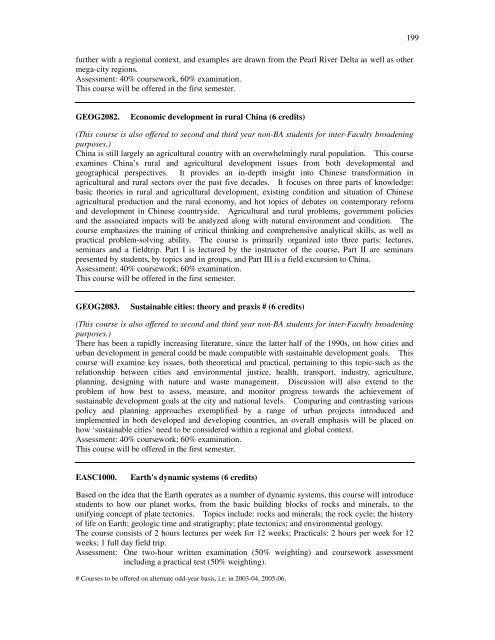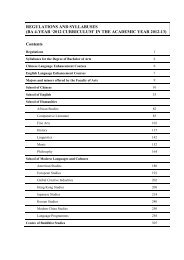Bachelor of Arts (BA) - The University of Hong Kong
Bachelor of Arts (BA) - The University of Hong Kong
Bachelor of Arts (BA) - The University of Hong Kong
You also want an ePaper? Increase the reach of your titles
YUMPU automatically turns print PDFs into web optimized ePapers that Google loves.
further with a regional context, and examples are drawn from the Pearl River Delta as well as other<br />
mega-city regions.<br />
Assessment: 40% coursework, 60% examination.<br />
This course will be <strong>of</strong>fered in the first semester.<br />
199<br />
GEOG2082.<br />
Economic development in rural China (6 credits)<br />
(This course is also <strong>of</strong>fered to second and third year non-<strong>BA</strong> students for inter-Faculty broadening<br />
purposes.)<br />
China is still largely an agricultural country with an overwhelmingly rural population. This course<br />
examines China’s rural and agricultural development issues from both developmental and<br />
geographical perspectives. It provides an in-depth insight into Chinese transformation in<br />
agricultural and rural sectors over the past five decades. It focuses on three parts <strong>of</strong> knowledge:<br />
basic theories in rural and agricultural development, existing condition and situation <strong>of</strong> Chinese<br />
agricultural production and the rural economy, and hot topics <strong>of</strong> debates on contemporary reform<br />
and development in Chinese countryside. Agricultural and rural problems, government policies<br />
and the associated impacts will be analyzed along with natural environment and condition. <strong>The</strong><br />
course emphasizes the training <strong>of</strong> critical thinking and comprehensive analytical skills, as well as<br />
practical problem-solving ability. <strong>The</strong> course is primarily organized into three parts: lectures,<br />
seminars and a fieldtrip. Part I is lectured by the instructor <strong>of</strong> the course, Part II are seminars<br />
presented by students, by topics and in groups, and Part III is a field excursion to China.<br />
Assessment: 40% coursework; 60% examination.<br />
This course will be <strong>of</strong>fered in the first semester.<br />
GEOG2083.<br />
Sustainable cities: theory and praxis # (6 credits)<br />
(This course is also <strong>of</strong>fered to second and third year non-<strong>BA</strong> students for inter-Faculty broadening<br />
purposes.)<br />
<strong>The</strong>re has been a rapidly increasing literature, since the latter half <strong>of</strong> the 1990s, on how cities and<br />
urban development in general could be made compatible with sustainable development goals. This<br />
course will examine key issues, both theoretical and practical, pertaining to this topic-such as the<br />
relationship between cities and environmental justice, health, transport, industry, agriculture,<br />
planning, designing with nature and waste management. Discussion will also extend to the<br />
problem <strong>of</strong> how best to assess, measure, and monitor progress towards the achievement <strong>of</strong><br />
sustainable development goals at the city and national levels. Comparing and contrasting various<br />
policy and planning approaches exemplified by a range <strong>of</strong> urban projects introduced and<br />
implemented in both developed and developing countries, an overall emphasis will be placed on<br />
how ‘sustainable cities’ need to be considered within a regional and global context.<br />
Assessment: 40% coursework; 60% examination.<br />
This course will be <strong>of</strong>fered in the first semester.<br />
EASC1000.<br />
Earth's dynamic systems (6 credits)<br />
Based on the idea that the Earth operates as a number <strong>of</strong> dynamic systems, this course will introduce<br />
students to how our planet works, from the basic building blocks <strong>of</strong> rocks and minerals, to the<br />
unifying concept <strong>of</strong> plate tectonics. Topics include: rocks and minerals; the rock cycle; the history<br />
<strong>of</strong> life on Earth; geologic time and stratigraphy; plate tectonics; and environmental geology.<br />
<strong>The</strong> course consists <strong>of</strong> 2 hours lectures per week for 12 weeks; Practicals: 2 hours per week for 12<br />
weeks; 1 full day field trip.<br />
Assessment: One two-hour written examination (50% weighting) and coursework assessment<br />
including a practical test (50% weighting).<br />
# Courses to be <strong>of</strong>fered on alternate odd-year basis, i.e. in 2003-04, 2005-06.
















